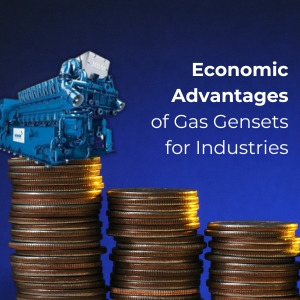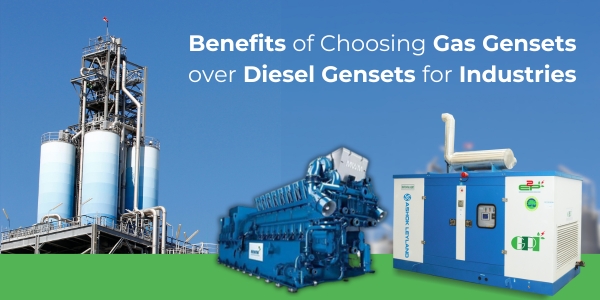Industrial facilities rely on dependable and uninterrupted power to keep everything running smoothly. Manufacturing processes, data centers, and critical infrastructure all depend heavily on a steady flow of electricity. Unexpected power outages can significantly disrupt operations, leading to financial losses and potentially compromising product quality.
Diesel generators have always been the go-to solution for backup power for years. However, these days have seen the emergence of a cleaner and more efficient option: gas gensets.

Environmental Stewardship: The Case for Gas Gensets
The most compelling reason to view gas gensets as options for energy production includes their significantly reduced environmental impact. In comparison to diesel generating units that produce harmful gaseous emissions into air; these types of equipment generate clean burning gases.
- Reduced Emissions: Gas gensets significantly lower Nitrogen Oxide (NOx) emissions – one of the contributors to smog and respiratory problems. Studies indicate that modern gas gensets can achieve low NOx emissions, meeting stringent regulations (< 0.4 g/kWh NOx)
- Minimized Particulate Matter: Diesel exhaust releases a substantial amount of Particulate Matter (PM), linked to respiratory illnesses and heart disease. While gas gensets emit some PM, the quantity is considerably lower. Advanced gas gensets with three-way catalysts can achieve particulate matter emissions below 0.01 g/kWh, further minimizing their environmental impact.
By choosing gas gensets, industries can take a substantial step towards environmental stewardship. This not only benefits surrounding communities but also helps companies meet stricter environmental regulations that are becoming increasingly prevalent worldwide.
Economic Advantages: Fueling Efficiency and Cost Savings
The environmental benefits of gas generators are boosted by a strong economic argument. In this regard, the following paragraphs will look at how converting to gas from diesel can result in significant monetary gains for your industrial operation.
- Fuel Cost Advantage: Natural gas is normally cheaper compared to diesel regardless of whether you are located in an area that has abundant reserves of natural gas. This translates into long-term savings on the cost of sourcing fuel. Depending on the prevailing prices of fuel in each region, switching from diesel to natural gas results in fuel cost savings of about 30%.
- Reduced Maintenance Needs: Unlike diesel generators, those dependent on natural gas often require minimal maintenance. The spark ignition systems found in most natural gas engines tend to be simpler and also undergo less wear and tear as against compression ignition systems used by their counterparts using diesel oils. It means lower labor and less downtime associated with maintaining these facilities as well. Gas gensets typically use oil change intervals of every 1000 hours while that for diesel is every 500 hours.
- Enhanced Efficiency: These modern types have excellent fuel-to-electricity conversion efficiency that ensures high fuel economy. When powered by modern gensets, electrical efficiencies can be above 40% unlike the diesels which range between 30-35%. Consequently, it means reduced consumption of fuel and low running costs in running the engine set itself.

The combined effect of lower fuel costs, reduced maintenance requirements, and higher efficiency can lead to substantial financial savings for industries over time. These savings can be reinvested into core business activities, research & development, or improving energy efficiency throughout the facility.

Beyond the Fumes: Why Diesel Gensets are a Waning Choice
Diesel generators have been powering industries for decades, but their ecological consequences cannot be ignored. Some of the disadvantages of pollution caused by diesel gensets are:
Air Quality Issues: As stated before, diesel gensets produce significantly more NOx and PM than gas gensets. These pollutants are responsible for smog, acid rain, pulmonary ailments that can affect employees as well as surrounding inhabitants.
Increased Carbon Dioxide Emissions: Although gas and diesel engines both emit CO2, carbon footprint associated with diesel engines is generally higher. This may be influential in the organization’s sustainability objectives and possibly lead to non-compliance with forthcoming environmental policies.
Industries today are increasingly keen on minimizing their carbon footprints due to current awareness of climate change concerns. In this respect, gas gensets offer a huge advantage over other options because they burn much cleaner.


















